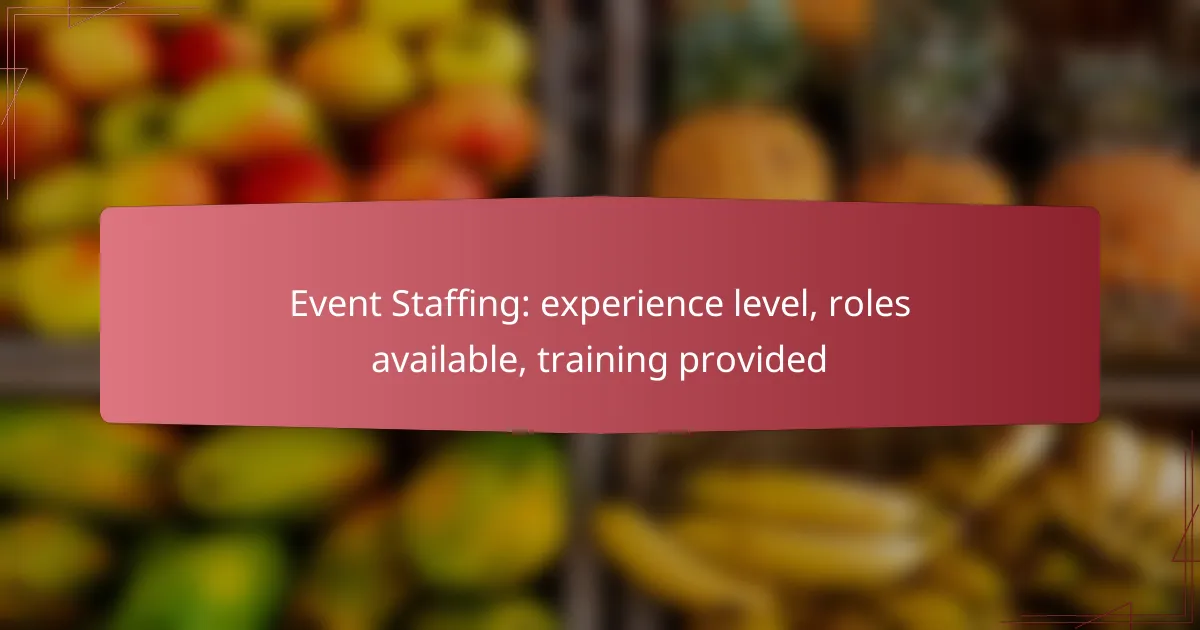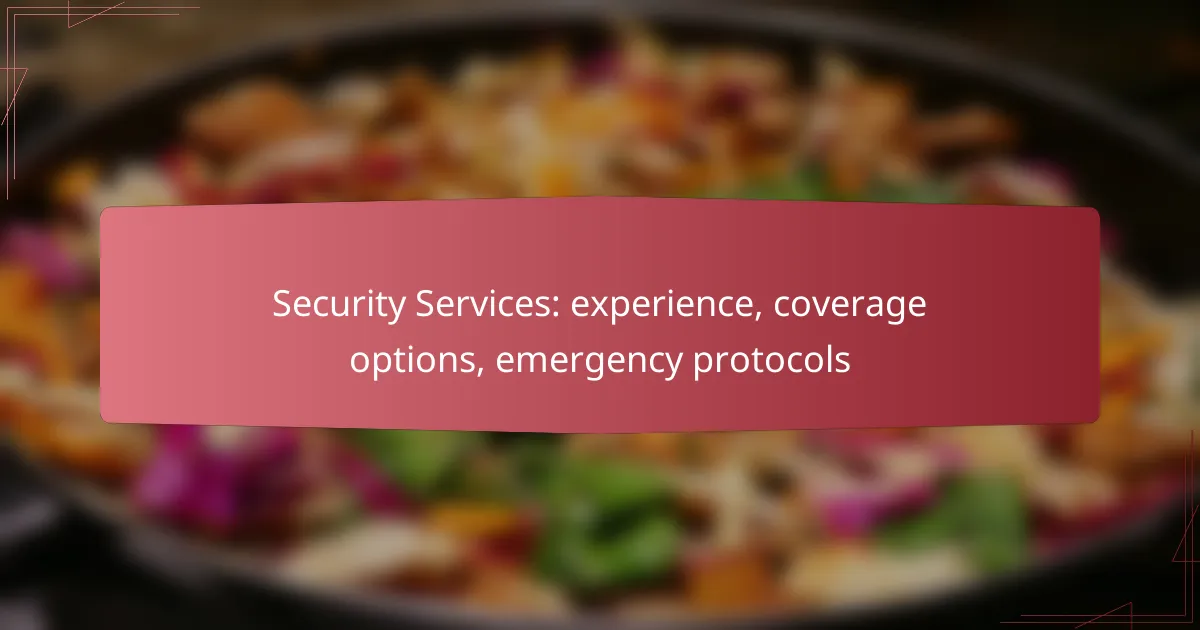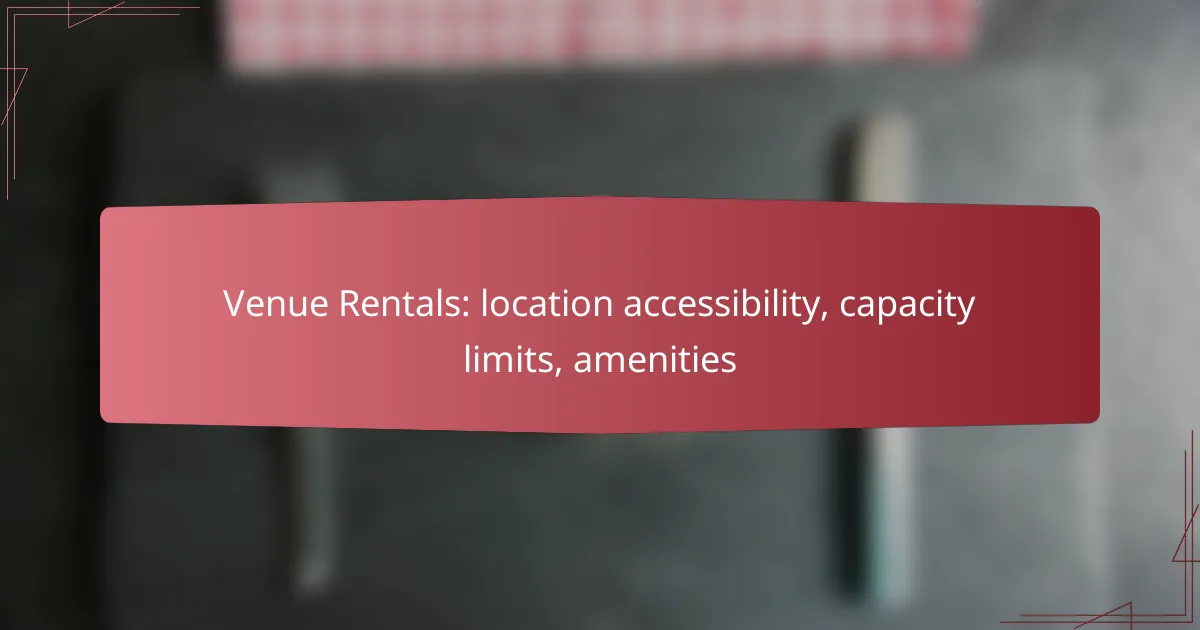In London, event staffing encompasses a variety of roles such as event managers, brand ambassadors, and security personnel, each essential for the seamless execution of events. Positions are available for all experience levels, from entry-level to senior roles, with specific responsibilities tailored to the complexity of the events. Comprehensive training is provided, covering on-the-job instruction, health and safety protocols, and customer service skills to ensure staff are well-prepared for their duties.
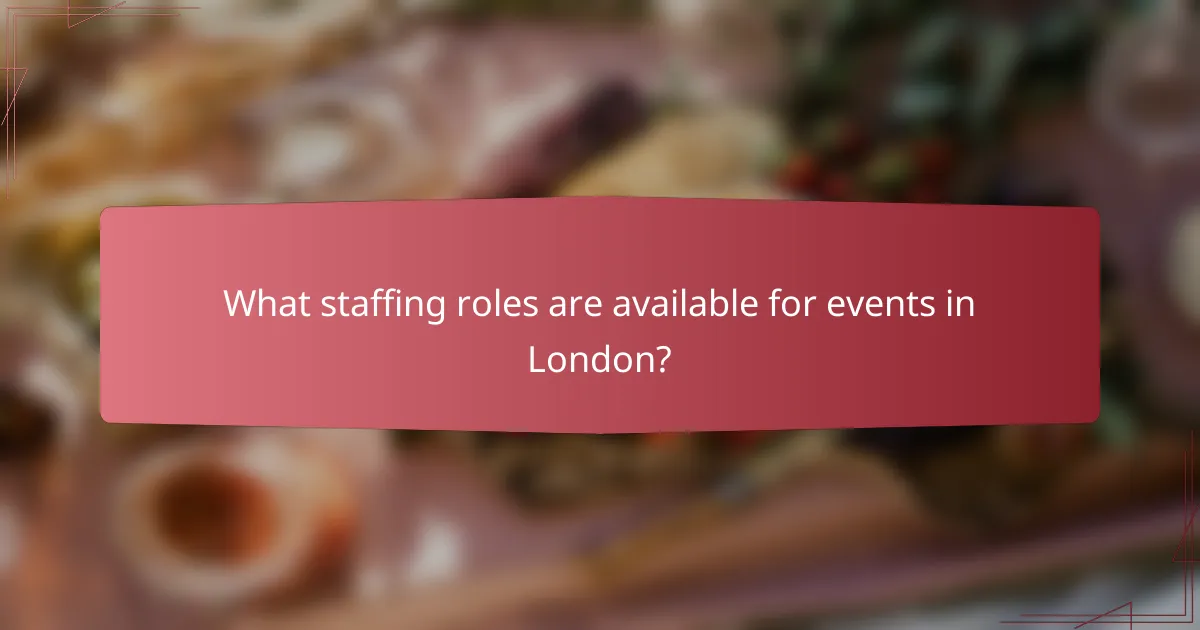
What staffing roles are available for events in London?
In London, various staffing roles cater to different aspects of event management, including event managers, brand ambassadors, security personnel, catering staff, and technical support. Each role plays a crucial part in ensuring events run smoothly and meet client expectations.
Event managers
Event managers are responsible for planning, coordinating, and executing events. They oversee logistics, manage budgets, and liaise with vendors and clients to ensure all aspects of the event align with the client’s vision.
Key skills for event managers include strong organizational abilities, communication skills, and problem-solving capabilities. They often work long hours, especially leading up to the event, and should be prepared for last-minute changes.
Brand ambassadors
Brand ambassadors represent a company or product at events, engaging with attendees to promote brand awareness and drive sales. They are typically outgoing individuals with excellent interpersonal skills.
When hiring brand ambassadors, consider their experience with similar products or events, as familiarity can enhance their effectiveness. Training may be provided to ensure they understand the brand’s messaging and goals.
Security personnel
Security personnel are essential for maintaining safety and order at events. They manage crowd control, check credentials, and respond to any incidents that may arise.
In London, security staff must be licensed under UK regulations, ensuring they are trained in safety protocols and emergency response. Hiring a reputable security firm can help ensure compliance and professionalism at your event.
Catering staff
Catering staff handle food and beverage service at events, from preparation to serving. Their roles can include chefs, servers, and bartenders, depending on the event’s scale and requirements.
When selecting catering staff, consider their experience in high-pressure environments and knowledge of food safety regulations. Providing training on the specific menu and service style can enhance the guest experience.
Technical support
Technical support staff manage audiovisual equipment, lighting, and other technical aspects of events. They ensure that all technology functions smoothly, which is vital for presentations and performances.
Hiring experienced technical support personnel can prevent common pitfalls, such as equipment failure or poor sound quality. It’s advisable to discuss specific technical needs with your team to ensure they are well-prepared for the event.

What experience levels are required for event staffing?
Event staffing typically requires a range of experience levels, from entry-level to senior positions. Each level has distinct responsibilities and skill requirements that align with the complexity of the events being managed.
Entry-level positions
Entry-level positions in event staffing are ideal for individuals with little to no prior experience. Common roles include event assistants, registration staff, and ushers. These positions often focus on basic tasks such as setting up venues, greeting attendees, and managing check-in processes.
To succeed in entry-level roles, candidates should demonstrate strong communication skills and a willingness to learn. Many employers provide on-the-job training to help new staff understand event protocols and customer service expectations.
Mid-level positions
Mid-level positions require some experience and typically involve more responsibility. Roles such as event coordinators and logistics managers fall into this category. These professionals are expected to oversee specific aspects of event planning, such as vendor coordination and budget management.
Candidates for mid-level roles should have a solid understanding of event operations and project management. Experience in similar roles or relevant certifications can enhance job prospects. Training programs may focus on advanced planning techniques and leadership skills.
Senior-level positions
Senior-level positions in event staffing demand extensive experience and strategic oversight. Roles like event directors and producers are responsible for the overall success of large-scale events. They manage teams, set budgets, and develop event concepts that align with client goals.
To qualify for senior-level roles, candidates typically need several years of experience in event management and a proven track record of successful events. Professional development opportunities often include leadership training and industry networking to stay updated on trends and best practices.
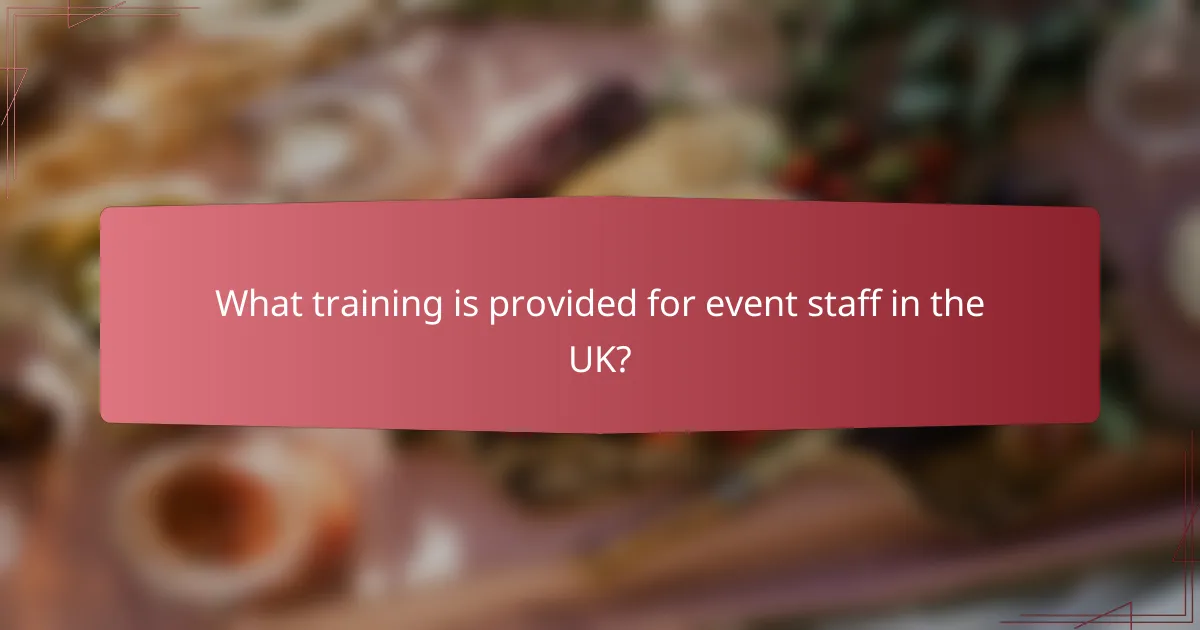
What training is provided for event staff in the UK?
Event staff in the UK typically receive a range of training to ensure they are equipped for their roles. This training often includes on-the-job instruction, health and safety protocols, and customer service skills, all tailored to meet industry standards.
On-the-job training
On-the-job training is essential for event staff, as it allows them to learn specific tasks and responsibilities in a real-world setting. New hires often shadow experienced staff to understand workflows, equipment use, and event-specific procedures.
This type of training can vary significantly depending on the event type, whether it’s a corporate gathering, wedding, or festival. Staff may receive hands-on experience in areas such as setup, breakdown, and guest management.
Health and safety training
Health and safety training is crucial for event staff to ensure compliance with UK regulations and to promote a safe environment for both employees and guests. This training typically covers emergency procedures, first aid basics, and the proper handling of equipment.
Staff may also learn about risk assessment and how to identify potential hazards at events. Regular updates and refresher courses are often required to keep staff informed about any changes in legislation or best practices.
Customer service training
Customer service training focuses on equipping event staff with the skills to interact positively with guests. This training emphasizes communication techniques, problem-solving, and conflict resolution to enhance the overall guest experience.
Effective customer service training often includes role-playing scenarios and feedback sessions to help staff develop confidence in their interactions. Understanding the importance of a friendly demeanor and attentiveness can significantly impact guest satisfaction at events.
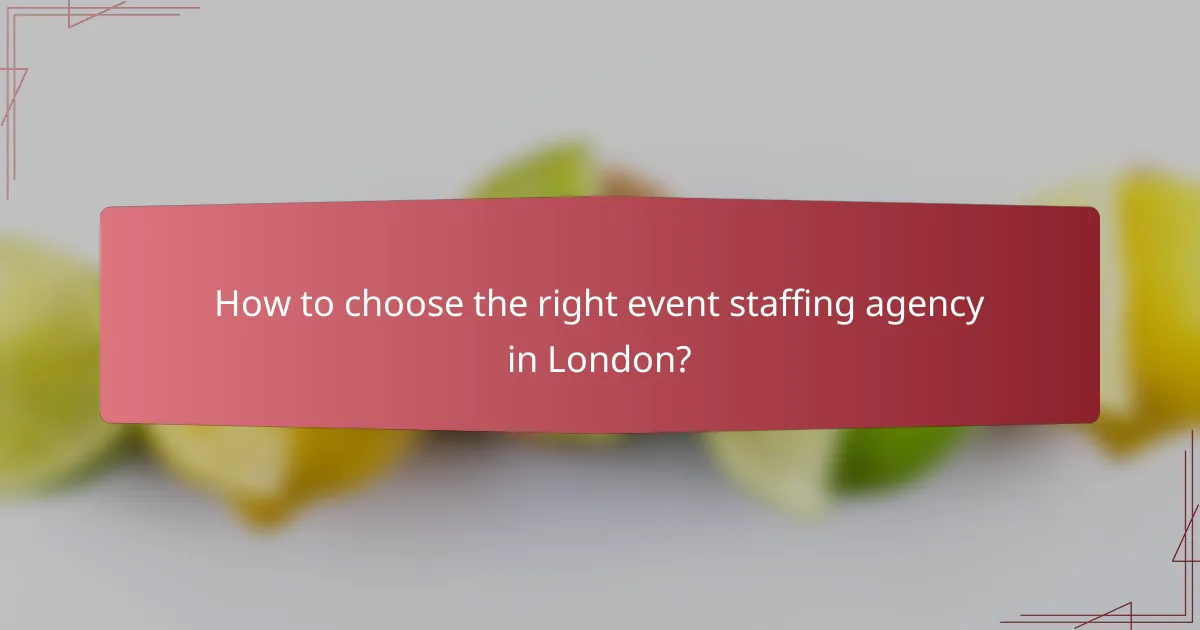
How to choose the right event staffing agency in London?
Choosing the right event staffing agency in London involves assessing their reputation, experience with specific types of events, and the training programs they offer. A well-chosen agency can significantly enhance the success of your event by providing skilled and reliable staff.
Check agency reputation
Start by researching the agency’s reputation through online reviews, testimonials, and case studies. Look for agencies that have a strong presence in the London market and positive feedback from previous clients.
Consider reaching out to past clients for direct insights. A reputable agency will be transparent about their successes and challenges, helping you gauge their reliability and professionalism.
Evaluate experience in specific events
Assess the agency’s experience with the type of event you are planning, whether it’s corporate, social, or large-scale festivals. Agencies that specialize in your event type will better understand the unique demands and nuances involved.
Ask for examples of similar events they have staffed in London. This will give you confidence in their ability to meet your specific needs and handle any challenges that may arise.
Assess training programs offered
Inquire about the training programs the agency provides for their staff. Agencies that invest in training ensure their personnel are well-prepared and knowledgeable about industry standards and best practices.
Look for agencies that offer ongoing training and development opportunities, as this indicates a commitment to maintaining a high standard of service. A well-trained team can adapt to various situations and enhance the overall experience for your event attendees.
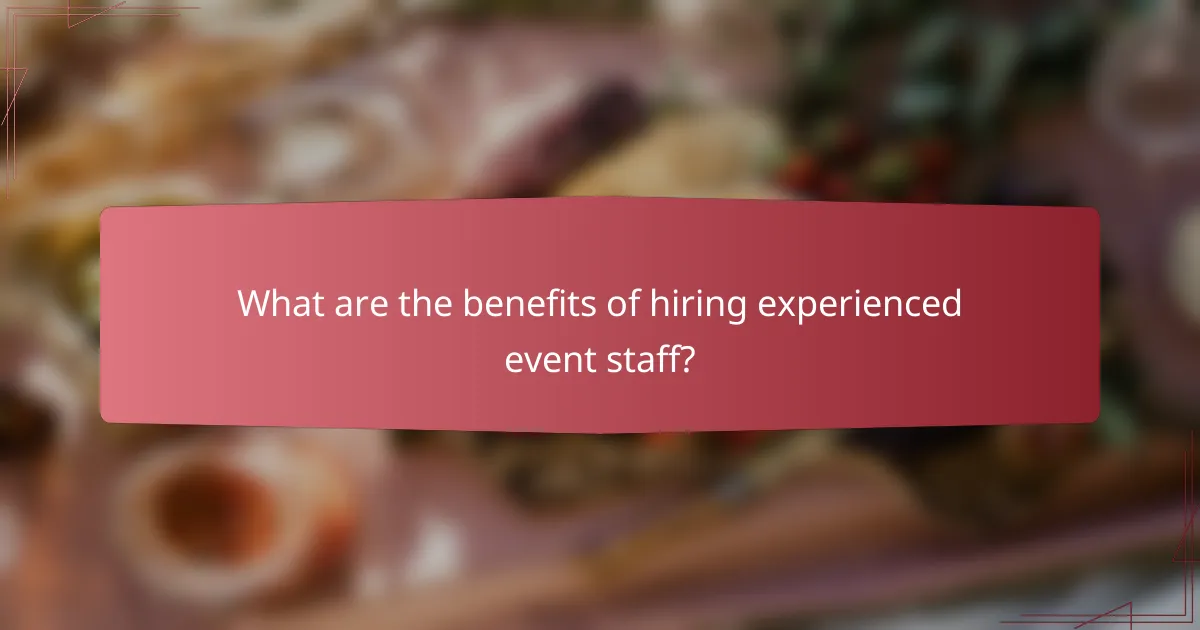
What are the benefits of hiring experienced event staff?
Hiring experienced event staff can significantly enhance the overall quality and efficiency of an event. Their expertise leads to smoother operations, better guest interactions, and a more polished experience for everyone involved.
Improved event execution
Experienced event staff are adept at managing various aspects of event execution, from logistics to coordination. Their familiarity with common challenges allows them to anticipate issues and implement solutions quickly, ensuring that the event runs smoothly.
For instance, seasoned staff can effectively manage timelines, oversee vendor interactions, and handle last-minute changes with minimal disruption. This level of proficiency can save time and reduce stress for event planners.
Enhanced guest experience
When event staff possess extensive experience, they are better equipped to create a welcoming and engaging atmosphere for guests. Their ability to communicate effectively and respond to guest needs fosters a positive environment that enhances overall satisfaction.
For example, experienced staff can provide personalized service, address concerns promptly, and facilitate enjoyable interactions, which can lead to higher guest retention and positive feedback. Investing in skilled personnel ultimately contributes to a memorable event experience.
